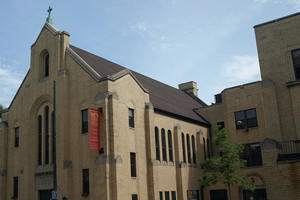Related Research Articles

John Dewey was an American philosopher, psychologist, and educational reformer whose ideas have been influential in education and social reform. He was one of the most prominent American scholars in the first half of the twentieth century.

Jane Addams was an American settlement activist, reformer, social worker, sociologist, public administrator and author. She was an important leader in the history of social work and women's suffrage in the United States and advocated for world peace. She co-founded Chicago's Hull House, one of America's most famous settlement houses. In 1910, Addams was awarded an honorary master of arts degree from Yale University, becoming the first woman to receive an honorary degree from the school. In 1920, she was a co-founder for the American Civil Liberties Union (ACLU).

Hull House was a settlement house in Chicago, Illinois, United States that was co-founded in 1889 by Jane Addams and Ellen Gates Starr. Located on the Near West Side of the city, Hull House opened to serve recently arrived European immigrants. By 1911, Hull House had expanded to 13 buildings. In 1912 the Hull House complex was completed with the addition of a summer camp, the Bowen Country Club. With its innovative social, educational, and artistic programs, Hull House became the standard bearer for the movement that had grown nationally, by 1920, to almost 500 settlement houses.

Augsburg University is a private liberal arts university in Minneapolis, Minnesota. It is affiliated with the Evangelical Lutheran Church in America. It was founded in 1869 as a Norwegian-American Lutheran seminary known as Augsburg Seminarium. Today, the university enrolls approximately 3,000 undergraduate students and 800 graduate students. The university is known for its emphasis on service learning; volunteering in the community is both an instructional strategy and a required part of a student's coursework.

Martin Olav Sabo was an American politician who served as United States Representative for Minnesota's fifth district, which includes Minneapolis; the district is one of eight congressional districts in Minnesota.
The settlement movement was a reformist social movement that began in the 1880s and peaked around the 1920s in England and the United States. Its goal was to bring the rich and the poor of society together in both physical proximity and social interconnectedness. Its main object was the establishment of "settlement houses" in poor urban areas, in which volunteer middle-class "settlement workers" would live, hoping to share knowledge and culture with, and alleviate the poverty of, their low-income neighbors. The settlement houses provided services such as daycare, education, and healthcare to improve the lives of the poor in these areas.

Democratic education is an educational ideal in which democracy is both a goal and a method of instruction. It brings democratic values to education and can include self-determination within a community of equals, as well as such values as justice, respect and trust.

Civic engagement or civic participation is any individual or group activity addressing issues of public concern. Civic engagement includes communities working together or individuals working alone in both political and non-political actions to protect public values or make a change in a community. The goal of civic engagement is to address public concerns and promote the quality of the community.
The National Council of Jewish Women (NCJW) is a grassroots organization of volunteers and advocates who turn progressive ideals into action. Inspired by Jewish values, NCJW strives for social justice by improving the quality of life for women, children, and families in the United States and Israel. Founded in 1893, The National Council of Jewish Women is the oldest volunteer Jewish women's organization in the United States. Currently, NCJW consists of 90,000 advocates across the country. There are sixty-two sections in twenty-one states. Prompted by Jewish values, the organization works with both the Jewish community and the general public to safeguard rights and freedoms for people worldwide. This objective is sought through a comprehensive program of research, education, and community service, placing particular emphasis on advocacy for women and children. Some of the NCJW's current issues of concern include women's reproductive rights, equal pay, comparable worth, domestic violence, and sexual harassment. The organization has headquarters in Washington, D.C.

Ellen Gates Starr was an American social reformer and activist. With Jane Addams, she founded Chicago's Hull House, an adult education centre, in 1889; the settlement house expanded to 13 buildings in the neighborhood.

The community of inquiry, abbreviated as CoI, is a concept first introduced by early pragmatist philosophers C.S.Peirce and John Dewey, concerning the nature of knowledge formation and the process of scientific inquiry. The community of inquiry is broadly defined as any group of individuals involved in a process of empirical or conceptual inquiry into problematic situations. This concept was novel in its emphasis on the social quality and contingency of knowledge formation in the sciences, contrary to the Cartesian model of science, which assumes a fixed, unchanging reality that is objectively knowable by rational observers. The community of inquiry emphasizes that knowledge is necessarily embedded within a social context and, thus, requires intersubjective agreement among those involved in the process of inquiry for legitimacy.

The Long Haul is an autobiography of Myles Horton, labor organizer, founder of the Highlander School and perhaps the first practitioner of what would later be called popular education. Highlander used the principles of democratic education - where students were the authorities in the classroom, the teacher is a facilitator, and the focus of education is teaching collective action for social change - to play a key role in the labor movement of the 1930s and the Civil Rights Movement of the 1950s and 1960s. Horton pioneered many of the educational principles Paulo Freire would make famous worldwide in the 1980s.
Public Achievement is an "initiative" of the Center for Democracy and Citizenship at Augsburg University. It involves young people working in teams on a public works project of their choice. An adult coach, typically a teacher or university student trained in the process and concepts of Public Achievement, guides team members through the following stages: exploration and discovery; issue selection and development; problem research; designing a project; implementing the action plan and making the work visible; and celebrating. Throughout the process, the coach holds team members accountable, and creates space for reflection and opportunities for each team member to practice and refine their civic skills. The coach makes overt connections between the group’s work and civic and political concepts. Ideally, an experienced PA site coordinator provides mentoring and assists PA coaches in reflecting on their own learning.

Yaacov Hecht , is an Israeli educator and worldwide pioneer of democratic education.

Chris Stedman is an American writer who serves as the Executive Director of the Yale Humanist Community at Yale University. Beginning in late 2017, he will assume the role of Director of the Humanist Center of Minnesota as well as Fellow at the Sabo Center for Democracy and Citizenship at Augsburg College. He was formerly the Assistant Humanist Chaplain at Harvard University, where he was the coordinator for the interfaith service program, Values in Action. He is the author of a memoir, Faitheist. Stedman's writing advocates outreach to seek "common moral ground between theists and atheists," and proposes achieving that aim by expanding interfaith dialogue to include atheists.
The Center for Engaged Democracy is located within Merrimack College’s School of Education. The center develops, coordinates, and supports academic programs around the country that are focused on civic and community engagement. The center supports such academic programs through a variety of initiatives for faculty, administrators, and community partners. There are currently over fifty academic programs focused on community engagement.
Action civics is an applied civic education process in which:

Erie Neighborhood House is a social service agency that works primarily with low-income, immigrant families in Chicago, Illinois. Operations began in 1870 as a ministry of Holland Presbyterian Church, a Protestant congregation located northwest of Chicago's Loop, and the organization quickly became part of the settlement house movement that emerged in the late 19th century. It currently offers programs and services from four locations—two in Chicago's West Town community area, a third in Little Village, and fourth at Jose De Diego Elementary School in East Humboldt Park—to a population characterized as predominantly Latino.
The World Forum for Democracy is a gathering each November in Strasbourg, France to debate the complex challenges facing democracies today and foster democratic innovation. The Forum is hosted by the Council of Europe and brings together members of civil society, political leaders and representatives of business, academia, media and professional groups. Past editions have revolved around themes such as "Bridging the gap: democracy between old models and new realities", "Re-wiring Democracy: connecting institutions and citizens in the digital age" and "From participation to influence: can youth revitalise democracy?".

Onward Neighborhood House is a non-profit organization located in the Belmont Cragin neighborhood of Chicago, Illinois. Originally founded as a settlement house in Chicago's West Town neighborhood during the 1890s, Onward House now provides direct services to working class and immigrant families on Chicago's Northwest side. Onward's mission is to open doors, improve lives, and uplift communities through educational, economic, and support services. The organization offers a variety of programs and services, serving both children and adults.
References
- ↑ "Sabo Center for Democracy and Citizenship - Sabo Center for Democracy and Citizenship". Sabo Center for Democracy and Citizenship. Retrieved 4 July 2018.
- ↑ "Jane Addams School for Democracy comes to a close - Sabo Center for Democracy and Citizenship". Augsburg.edu. 27 December 2016. Retrieved 4 July 2018.